

How to Prep for a Mock Sales Pitch Interview + Creative Ways to Stand out

You can include all the fancy words and accolades you want on your resume. What interviewers want to see is your sales skills in action.
If you’re gunning for a sales job , it’s almost guaranteed you’ll be asked to do a mock sales pitch for your interview. Nail this pitch, and you’ll have a better shot at your desired job.
So, how can you set yourself up for success at your next sales interview? Let’s talk about:
- What is a mock sales pitch in an interview & why do you have to do one?
- How to prep for the mock sales pitch interview
- Three sales pitch examples for your interview: learn how to pitch yourself
- Creative mock sales pitch ideas for an interview
By the end of this article, you’ll be ready to walk into that office (or log into that Zoom meeting) with full confidence in your mock sales pitch skills.

What is a Mock Sales Pitch in an Interview & Why Do You Have to Do One?
Your resume and cover letter explain who you are and what you’ve done, and the questions you answer during your sales interview will tell the interviewer more about your personality and whether you’ll fit with the team.
However, watching your pitch is the best way to understand whether you can cut it as a salesperson.
That’s why—nerve-wracking as it may be—most interviewers will have you run through a mock sales pitch during your interview.
Want to ace your sales interview? Here's how to prepare a winning mock sales pitch.
How to Prep for the Mock Sales Pitch Interview

Wondering what to do before your sales interview? Here are five tips to help you prepare successfully and woo your interviewer:
1. Have a Clear Understanding of the Company and the Product
If the hiring manager asks you to do a mock sales pitch in your interview, you should know what you will be selling. In most cases, this means getting to know the product that this company sells.
Of course, the interviewer doesn’t expect you to have expert knowledge of the product, but you should know enough to sell it properly.
So, research the company and the product. Get to know their style and personality through the sales copy on their website. Watch any videos or demos they have that talk about the product. Read what customers say about them. If it’s a SaaS product, start a free trial and get to know it from the inside.
Questions might come up while researching the product. Ask them—shows you’re interested and taking this process seriously. Here’s what Scott Schwartz, VP of Sales at HHAeXchange says about this :
I love when candidates send me questions before the presentation and collaborate with me… it shows me they’re paying attention.
The more you know about the product and industry, the better. So, why not ask someone who knows?
2. Know the Prospects You’ll Be Selling to
Your interviewer wants to know that you have the skills to adapt to their key audience and effectively speak with prospective customers.
So, as you learn about the company, dig into its customer base and get a sense of its ideal customer profile. What kind of companies work with them? Are their customers all in a specific industry? Is the primary target market a particular department inside a company or even a specific role?
When you walk into a mock sales pitch with a clear understanding of the company’s primary customer, you are already setting yourself apart from other candidates. Prove to the interviewer that you can speak quickly with prospective customers. Take time to pick up on the lingo or understand their main concerns.
Again, if you have questions about the company’s customer base, ask before the interview. This will show that you’re willing to put in the extra effort and that you want to reach the customers, not just get the job.
3. Remember to Showcase Your Sales Strengths, not Your Knowledge of the Product
As we said above, no one expects you to be an expert on a product you’ve never sold. Instead, focus on what makes you stand out as a sales rep.
Throughout your sales career , however long or short, you’ve honed your skills and developed your unique selling style. You want to showcase this in a mock sales presentation during your interview.
For example, are you adept at discovering needs? Do you have a unique way of turning objections into benefits ? Are your questions always spot-on? Think of the mock sales pitch as your opportunity to showcase your best skills and prepare accordingly.
4. Think About How You’ll Answer Common Sales Interview Questions
While you can never be 100 percent sure what you’ll be asked during a sales interview, there are a few sales interview questions you will most likely hear in some form or another.
Here are some guidelines on how to answer some of the more common sales interview questions:
Why are you interested in sales?
You want to have a clear reason for being in sales and a strong narrative around it. When I interview people, one of my main questions is why.
For some people, the reason will be that they want to make a lot of money. For others, it will be because they have much experience and insight into the particular industry. After all, they like to communicate with people for many other reasons. There are no good or bad reasons, but they should be your honest reasons, and you should have clarity about this.
Why do you want to sell this product? Why do you want to work with this company?
Believing in a product is a good motivation to sell it, which is why most interviewers will ask some variation of this question. Know something about the product and the target market, and you’ll prove you took the time to develop an interest in this sales job with this company (not just any sales job with any company).
When was the last time you missed the quota?
If you tell an interviewer you’ve never missed quota, they’ll assume you’re lying. Because, let’s face it, all salespeople miss quota at some point. This question aims to poke at your vulnerable spots and see how you handle the pressure. So, talk about missing quota, why you missed it, what you learned from the experience, and how you’ve improved.
What was the most challenging/most significant deal you’ve closed?
This is your opportunity to impress, so prepare beforehand by choosing the right sales story to share. Frame the story well, think about the skills you used to overcome challenges, and give real figures for the deal if possible.
5. Come Into the Interview with a Plan of Action
Hiring managers love proactive workers. So, what are your plans starting Day 1 of your new job? How do you plan to start learning the systems and products you’ll be selling? What’s your process for getting to know the unique sales process of this company? How will you get to know the customers and the competitors?
That is true; most companies will have specific onboarding processes that answer these questions for you. But when you come into the interview prepared with a plan of action to get yourself started, you prove you’re ready to hit the ground running and that you’re the type of worker who takes the initiative.
I generally look for people who focus initially on learning. If someone tells me they'd like to start in the new company by talking to different team members to gain internal knowledge, that's always a good thing.
These guidelines are your starting point to prepare for the interview and mock sales pitch.
3 Sales Pitch Examples for Your Interview: Learn How to Pitch Yourself

At some point, the interviewer will probably ask: “So, tell me about yourself.”
This is probably one of the most common (often most dreaded) interview questions. In a sales interview, though, this isn’t just a friendly opener. It’s an opportunity to give a pitch that sells yourself.
So, how can you develop a sales pitch that proves you’re the right hire for the position? Here are three sales pitch examples for an interview that will sell yourself as a sales professional:
1. Use Common Industry Problems to Capture Their Interest
How can you help solve the issues that this company is facing?
You know the everyday struggles and challenges facing sales teams because that’s your world. So, use that knowledge to sell yourself as the solution.
Here’s an example of this from Zety :

Photo credit: Zety
This example pulls at a common industry problem and shows how this salesperson created a solution to that problem.
2. Build a Narrative with Your Experience
It’s no secret that stories are memorable and help get your point across better.
But that’s not an excuse to respond with your life story when asked to tell the interviewer about you.
Instead, frame your career story with a narrative that sells your skills and expertise:
3. Build a Pitch Based on Questions
Creating a sales pitch for an interview is the same as building a pitch to hook new prospects: you need to know their needs before presenting a solution.
So, what are the needs of the company you’re interviewing with? What are they looking for in a sales rep?
Here are some questions you can ask the interviewer to frame your responses to their needs better:
- Is this a new or existing position?
- What did you like about the last person who filled this position?
- What was missing from the last person who filled this position?
- What are your goals for a new [role] in relation to the company?
- How do you hope to benefit from filling this position?
- How is the success of this position measured?
When you ask these kinds of questions, you can connect the benefits of hiring you to their expressed needs.
Creative Mock Sales Pitch Ideas for an Interview
You’ve gone through the basic steps of preparing for an interview, which includes a mock sales pitch.
But how can you take your mock sales pitch to the next level?
Set the Stage Where You Can
Sometimes, you may lack some context during your mock sales pitch. Roleplay can feel stiff and awkward, so embrace and roll with it. Where you lack context, create it.
For example, start the mock pitch with something like this: “I’m going into this pitch assuming you were an inbound lead and that we’ve established basic product fit on an initial phone call.”
Where you can take some control of the situation, do so. This will allow you to pitch more naturally since you’ve been able to set the scene, and everyone knows where they’re coming from.
Focus on Qualification
Qualification is a massive part of the sales process, and the hiring manager will want to be clear that you know how to ask the right questions and weave those answers into your pitch.
So, become good at qualifying your sales leads . Don’t fall into the trap of giving a monologue simply because the situation is a bit awkward. Focus on understanding the prospect's needs and delivering a solution that fits those needs.
And yes, this can even work for the dreaded “Sell me this pen.” Find out why the prospect needs a pen and what they want from a pen, and then you’ll know how to sell it to them effectively .
Let Your Personality Shine Through
You are a unique soul whose style and personality shine through daily as you hit the phone. That should not change simply because you’re doing a mock sales pitch.
The pitch may be fake, but the results are just as real.

So, let your true personality shine through . Be as natural as possible, and make a conscious effort to relax before you begin. Talk to your interviewer like you talk to your prospects every single day. Treat this as a real sales pitch you’re giving to an actual customer, and you’ll feel more like yourself as you pitch.
Remember to Close
While it may seem obvious, you should plan ahead about how you want to close this deal .
In a real-life sales environment, you would have a specific call to action prepared to move this prospect along in the sales process . Since you’re working with an imaginary sales process, set an imaginary call to action for your mock sales pitch and push for that next step at the end.
You would never skip or minimize this part of the pitch in real life, so treat it the same in your mock pitch.
Show How Well You Take and Use Feedback
Many sales interviewers provide feedback and then ask you to give a second mock sales pitch during the interview.
How you respond to this feedback tells interviewers two important things:
- Whether you’re humble enough to accept criticism from your boss or peers
- How well do you listen to and apply feedback
The hiring manager wants to know if you’re coachable. A salesperson who accepts and applies feedback will quickly adjust their strategies and processes to best suit the customers, not cling to old strategies simply because they’re comfortable with them.
Coachability is an essential quality for a salesperson, so use this opportunity to demonstrate that you can use feedback practically.
Even if the interviewer doesn’t give you feedback, you can proactively ask for their opinion once your mock sales pitch is finished.
Nail Your Next Sales Interview and Mock Sales Pitch
Any job interview can be terrifying, but a sales interview with a mock pitch is even worse.
That said, when you’re well-prepared, you can confidently go into that interview.
Preparation for a sales interview is more than just researching the company and getting to know the product (although that’s important). You need to be ready with the right attitude to sell yourself to the interviewer.
Think of the entire sales interview as just another pitch, and you’ll approach it with the same energy and finesse you use to sell every day.
But there’s always room for improvement.
Want to take your sales pitches to the next level? Take a deep dive into the Ultimate Sales Pitch Guide , with eight chapters of expert advice on developing, scripting, delivering, and following up on a high-performing sales pitch .
One of the most essential skills to master for any sales rep is follow-up. Whenever I interview a sales rep, and I see that they have excellent follow-up skills, that's a big plus. I've written an entire book on the subject, and you can get it free today:
DOWNLOAD THE FOLLOW-UP FORMULA →

More articles from The Close Blog

Discover our latest free sales tools powered by AI
Learn from the sales pros with our free sales guides.
(781) 327-8910

How to Prepare for a Mock Sales Presentation in a Job Interview

8 Steps to Crush the Mock Sales Presentation in the Job Interview
Interviewing for a sales job is nerve racking enough as is. From the initial phone screen with a recruiter, to a few different in-person interviews with members of the sales team, to completing any assessments or projects, to meeting with the hiring manager…it can be a lot.
You’ve done it all and made it to the final stages of the sales interview process seamlessly. Well done.
Now you’re onto one of the last steps of the process… completing a mock sales presentation.
What is a mock sales presentation?
A mock sales presentation is a common exercise during the sales interview process for companies to gauge a candidate’s ability to present a product/solution, as well as determine how that candidate runs a meeting, and holds the attention of a room. The hiring manager is trying to understand the candidate’s ability to sell, and determine if they are the right salesperson to hire who can effectively sell the value of their product/service to a decision maker. They are evaluating your hard and soft selling skills.
As a contending candidate for the sales job you’re interviewing for, the mock sales presentation is an opportunity for you to do your homework, practice, and come prepared to knock the sales presentation out of the park. OR it’s a chance for you to not prepare, “wing it,” and throw away your chances of getting the job offer.
Now let’s assume if you’re reading this post, you want this sales job and want to crush your mock sales presentation. If that’s the case, read on…
Here are 8 steps to help you prepare for your mock sales presentation.
1. Embrace the Awkwardness of Role-Playing
A mock sales presentation is role-playing. It’s make believe, it’s weird, it’s awkward…it’s supposed to be. That is the point. Companies want to see how you perform and what you do when you are asked to do something outside of your comfort zone. Go own it.
2. Do Your Homework
Collect the necessary information you need to prepare for this assignment. Usually, the company will provide you with a scenario and sales presentation details, including: where are you in the sales cycle, the goal of the meeting, reading materials, an itinerary with titles, and a slide deck to work off of.
If they do not supply this information, ask for it. You would have all this information going into a real sales meeting, so you should have it now.
3. Understand You Are NOT an Expert
In preparation for your presentation, understand that you are NOT supposed to be a complete expert on this company or their products…that is not the point of exercise. You want to be knowledgeable of the company and its products, but this is a test of your soft skills and how you present. You do this every day. Show them how you do it.
{ Related Article: 30 Ways to Ruin an Interview in 30 Seconds }
4. Do Not Go Overboard With Your Slide Deck
You will build out a slide deck of content, do not go over the top. Try not to make too many slides. There are great tools and technology that can help you outline your presentation. Remember that PowerPoint is a tool to help present but that it is not THE presentation. You should also email the slide deck to yourself before the meeting and you may also want to have a few print outs just in case.
{Get Even More Prepared! Watch this Video on How to Prepare for a Mock Sales Presentation Below}
5. Set the Stage for the Performance
Game day is here. You’ve prepared and practiced, now it’s time to perform.
- Show up to the office early (don’t be late). Arriving 10-15 minutes early is appropriate, especially if you need time to set up your presentation.
- Dress the part (professional attire is always your best bet). You don’t want an outfit that distracts your audience and takes away from your presentation. Keep it classy with a suit and tie (no Daffy Duck ties), or a dress/skirt and simple blouse.
- Have your slide deck and other materials with you. Technology may not always cooperate so make sure you have everything you need to present if things go awry.
- Set the stage before going right into the role-play. When you enter the room for the mock sales presentation, reconfirm who everyone is (the parts they play) and where you are in the sales process. Once all of that is clear, it’s showtime.
6. Give the Shakespearean Performance of a Lifetime
It’s time to relax and do what you do… SELL . Stand up with confidence, high energy, make eye contact with everyone around the room, and talk TO your potential customers, not AT them.
They will chime in with questions. Some of the questions will be fair and some of them will not. Do not get frustrated or disheveled. Remember, this is make believe. If you are asked a question that you do not know the answer to, don’t sweat it. That happens all the time in sales. However, do not make up an answer. You would never do that in a legitimate sales meeting so do not do it now. Slow it down, tell them that you do not know the answer but you will do the necessary research to get the answer to him/her by the end of day.
7. Wrap Up With Q&A…Then CLOSE
Like with any sales presentation, make sure you allow the panel to ask questions. Even if they are asking questions throughout the presentation, still give them some time for Q&A to wrap up with you. Again, you would do this in a real sales meeting, so do it here too. And DON’T FORGET TO CLOSE. Just like in any sales meeting, you need to close and ask about next steps.
8. Break Character
Lastly, at the end of the presentation when there are no further questions, it’s time to break character and look for feedback and coaching on your mock sales presentation.
Get back to the interview and ask the hiring manager, “What did you like most about the presentation?”, “What did you like least?”, “What could I improve on?”, “Would any of this approach fit into this sales model?”’
You are showing them that you do not know it all and that you are coachable. They will provide you with some candid feedback and voice their concerns.
*Remember to close the interviewer . After this presentation ask about next steps in the interview process. Make sure you are a top candidate moving forward in the process.
The mock sales interview is a unique step in the interview process and a step to move top candidates towards offer stage. Take pride that you made is this far in the process, and make sure you take the time to prepare and excel at this stage of the interview. Practice makes perfect. Review these 8 mock sales interview steps and go get the job!
SEARCH TREELINE’S SALES JOBS>>
Share this story, choose your platform, related posts.

How Do I Choose an Executive Recruiter for Sales Recruiting?
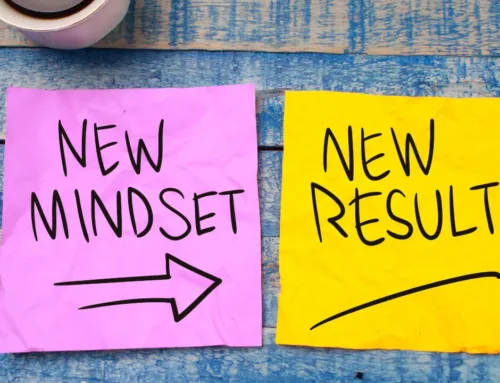
Staying Positive: Navigating the Job Search with Optimism

Treeline Inc. Named by Clutch as Leading 2022 Global Provider of HR Services to fill Sales Positions
Sign up for our blog
All fields required
First Name (required)
Last Name (required)
Email (required)
What interests you?
Sales Jobs, Advice & Tips Sales Recruiting Best Practices Sales Strategy Advice
This site is protected by reCAPTCHA and the Google Privacy Policy and Terms of Service apply.
What our happy clients are saying
Contact Us for a Free Consultation
781-327-8910, [email protected].
Tell us more about your business and how we can help.
Full Name (required)
Company Website (required)
Business Email (required)
Phone Number (required)
Role You Are Recruiting For
What can we help you with?
Expand My Sales Team Improve Sales Recruitment Performance Sales Team Evaluation Compensation Sales Characteristics of Top Performers Create a Sales Job Description Sales Job Tips and Advice

TREELINE INCORPORATED 15 Lincoln Street, Suite 314 Wakefield, MA 01880
Main – (781) 327-8901 Sales – (781) 327-891 0 [email protected]
Quick Links

© 2024 All rights reserved. Treeline, Inc
Terms of Use and Privacy Policy
Privacy Overview
Sales Presentation for Interview: The Dos and Don’ts
- July 31, 2022

When I was first starting out in sales, I remember being so nervous about giving a sales presentation for interview. I would practice over and over again, but as soon as I got in front of the room, all my carefully rehearsed words would fly out of my head.
If you’re feeling similar nerves about an upcoming sales presentation for interview, don’t worry – you’re not alone. With a little bit of preparation though, you can deliver a killer presentation that will impress your interviewer and land you the job.
Here are some dos and don’ts to keep in mind when preparing for your big day.
What is a Sales Presentation for Interview?
A sales pitch is a chance for you to demonstrate your selling skills.
A sales interview presentation is a great way to show employers your confidence and competence in speaking about a product or service. By preparing and delivering a well-organized presentation, you can demonstrate your ability to communicate effectively and engage with an audience.
A sales interview presentation is an opportunity for a salesperson to demonstrate their selling skills. This is important because selling is a key part of the job.
A sales interview presentation is a key part of the sales process. It allows you to ask the right questions, provide the best answers, and deliver an engaging sales pitch . By preparing for this important step, you can increase your chances of success.
If you want to ace your next sales interview presentation, here are a few steps that will help you get the job offer!
Personality and Professional Image
A huge part of making a successful sales presentation is how you conduct yourself. Building rapport with your prospect, engaging them, and exuding confidence are all important.
When you’re dressing for an interview, it’s important to look professional and put together. Business formal or business casual attire is typically expected, and wearing a hat or lounge clothes can be deal-breakers.
When participating in a video call with potential employers, it is important to be aware of your surroundings and what will be visible on camera. If possible, situate yourself in a professional setting or have your background blurred to avoid any distractions.
Designing The Presentation
Build your own presentation. Don’t be one of the 25% of businesses that use outdated presentation templates.
When you’re creating your presentation, keep in mind that your audience will appreciate a shorter, more concise presentation. The average attention span has decreased from 12 minutes to just 5 minutes over the past decade, so it’s important to make your point quickly and effectively.
Business managers have limited time and may not have the attention span to sit through another presentation or report.
Citing facts is a great way to get someone’s attention, but you need to make sure they’re from a reliable source. While Wikipedia articles can be useful, they can often be edited, so it’s best to use another website.
Visuals are an effective way to convey your message as they are processed by the human brain 6,000 times faster, and are 6 times more memorable than words.
A helpful tip is to limit the information on each slide to three key points. This will make it easier for your audience to understand and remember the points you are trying to make. Introducing each point one at a time will also help with this.
Avoid using many slide decks as this can be a distraction.
After you have completed writing your presentation, it is time to practice. Get colleagues, friends, and family to listen to your presentation after you have memorized the script. This will help catch any errors you may have missed .
They might find mistakes that you missed.
After your practice sessions, ask your audience to quiz you. They should ask tough, probing questions.
This will help you be prepared for anything that is thrown your way during the presentation so that you can stay confident and on track.
Steve Jobs was a master at giving presentations. His audiences would often give him standing ovations at the end of his talks.
Although he was a master of presenting, Steve Jobs would still practice his script for an average of two full days before going on stage. It can be difficult to put that much effort into practicing, but if you can manage to practice for a few hours, you will see significant improvements in your performance.
Preparing for Your Mock Presentation
A great way to prepare for a mock interview is by sending a pre-interview email to the interviewer that confirms the time of the meeting, the topics of discussion, and the goals of the conversation.
Before you begin your presentation, it is essential that you have done your research. Familiarity with the company’s culture and the content of your presentation will help to ensure that you are choosing a relevant company and buyer persona.
Your presentation is what your interviewer is going to be watching. These are some pointers to keep in mind when making your presentation look clean and polished:
- 5-10 slides maximum
- Consistent company theme: logo, color palette, imagery
- Have a clear agenda
- Minimal wording
The most important step before a mock interview is to prepare. Know everything about your upcoming presentation and be able to answer any question that the interviewer throws at you.
After you feel that you’ve rehearsed enough, continue to rehearse. This will allow you to smoothly and naturally flow through your pitch.
Delivering a Great Sales Presentation for Interview
On the big day, make sure to arrive 15 minutes early. This should give you enough time to check in, set up your presentation, use the washroom, and do anything else before it’s time to meet with your interviewer.
The first minutes of a sales presentation are extremely important. Make sure you prepare both mentally and physically before walking in.
Remember to keep making direct eye contact, and speak in a clear, confident voice. Your sales skills are what have gotten you to this point, so use them to your advantage!
Stand up straight with your arms at your sides , give a firm handshake, smile often, and ask questions to keep your audience engaged .
Discovery Questions During Sales Presentation for Interview
Start your meeting with a few discovery questions that help to uncover a prospect’s needs.
Questions you can ask include:
- What problem are you trying to solve ?
- What are your goals?
- When do you need to achieve these goals?
- What is your budget?
- Who is involved in the decision ?
- Are you exploring other options?
- When are you planning to make this decision?
- How can I help make this easy?

Making Your Sales Presentation for Interview
During the pitch, make sure you demonstrate the knowledge you have of the products, the company, and the competitive environment. Be prepared with high-level information on what differentiates you from the competition.
When educating customers, it is important to be focused and succinct in your presentation in order to avoid lingering on one topic .
Use the answers you discovered during your research to incorporate into your presentation. Also, be prepared to address any objections to your proposal.
If you are unable to answer a question, do not try to fake it. Simply refer them to someone more knowledgeable or offer to send a reply in a follow-up email.
If It Doesn’t Go Well: Don’t Panic!
No matter how your sales pitch goes, never fear – there’s always something unpredictable in sales!
If it doesn’t go well, don’t panic! Take a deep breath and restart where you left off . You can do this!
Just because you made a mistake doesn’t mean you won’t close a sale. What’s important is how you recover from it.
You can always apologize if you need to and ask for feedback on how you can do a better sales presentation in the future .
Close The Meeting
End your presentation by summarizing your key points and discussing the next steps. Schedule a follow-up meeting to discuss them.
Don’t just leave without a plan for your next interaction with that prospect.
Post-Presentation Feedback
After your pitch, be prepared to receive feedback from your prospect. Be open to their suggestions, and thank them for their input.
If you’re asked for feedback from someone, be as honest as possible. Don’t overpraise yourself, but don’t undersell yourself either.
Send a thank-you email to the prospect that summarizes the conversation you had with them.
When conducting sales demos, you don’t need to have a deep understanding of the product or solutions. Instead, the focus should be on how you demonstrate, how you engage, and your commitment to the interview.
So, don’t worry about not having an in-depth knowledge of the product or service. Just be enthusiastic, and let your natural personality shine.
Conclusion: Sales Presentation for Interview
When it comes to giving a sales presentation for interview, there are some dos and don’ts that you should keep in mind. By following these tips, you can deliver a killer presentation that will impress your audience.
Share this:
- Click to share on Twitter (Opens in new window)
- Click to share on Facebook (Opens in new window)
- Click to share on LinkedIn (Opens in new window)
- Click to share on Reddit (Opens in new window)
- Click to email a link to a friend (Opens in new window)
More Posts:

B2B Network Social Business Bill of Rights
Too many B2B network marketers see social media as just another marketing channel, when in reality it is so much more. Social media has surpassed

Cloud Computing vs. SaaS | Mass Cloud Customization
Cloud Computing vs. SaaS Salesforce.com is a successful SaaS company that has taken the idea of mass cloud customization to new heights with their Force.com

What is Annum? The Answer Might Surprise You!
If you’re wondering “what is annum,” then you’ll be surprised to know what it means. This article explains it and how to use it in

SaaS Metrics: How Viral Growth Trumps SaaS Churn
SaaS Metrics: Everybody wants their startup to be successful. The goal of this post is not to complicate the theories behind viral growth, but instead,
Send Us A Message
Discover more from saas partners.
Subscribe now to keep reading and get access to the full archive.
Type your email…
Continue reading
Home Blog Presentation Ideas How to Give A Compelling Interview Presentation: Tips, Examples and Topic Ideas
How to Give A Compelling Interview Presentation: Tips, Examples and Topic Ideas
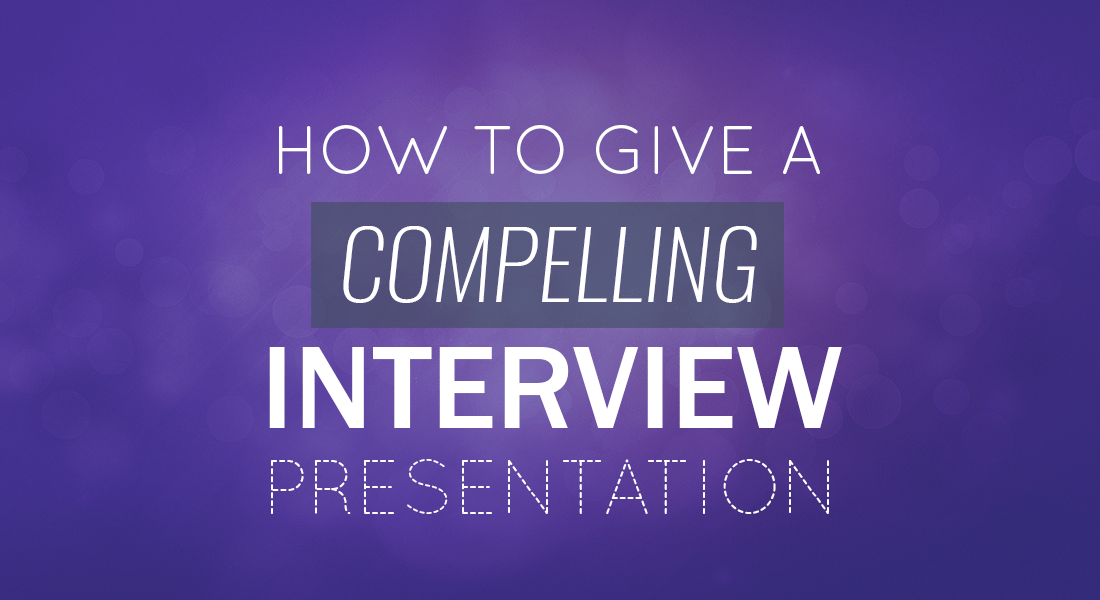
Interview presentations have now become the new norm for most industries. They are popular for sales, marketing, technology, and academic positions. If you have been asked to deliver one for your job interview presentation, prepare to build a strong case for yourself as a candidate.
Giving a general presentation is already daunting. But selling yourself is always the hardest. Spectacular credentials and stellar expertise don’t count much if you cannot present them clearly, which you are expected to do during your interview presentation.
So, let’s prime you up for the challenge. This post is action-packed with job interview PowerPoint presentation examples and will teach you the best way to do a presentation without stressing too much!
Table of Contents
What is an Interview Presentation?
What should an interview presentation look like, how to prepare for a job interview presentation: the basics, define your structure, what slides to include, how to come up with 15-minute interview presentation ideas, how to conclude your interview presentation, how to prepare for an interview: the final tips, what to do at the first interaction with the company elevator pitch for interview, presentation design tips, how to overcome presentation anxiety, tips on maintaining positive body language throughout the presentation, your final act.
An interview presentation, also known as a job interview presentation or interview portfolio, is a formal and structured way for candidates to showcase their skills, qualifications, and suitability for a specific job position during an interview. It goes beyond the typical Q&A format of interviews, allowing candidates to demonstrate their expertise through a prepared presentation. Employers commonly request interview presentations in various industries, such as sales, marketing, technology, academia, and management roles. These presentations serve several important purposes: assessing communication skills, evaluating cultural fit, measuring expertise, analyzing problem-solving skills, and observing presentation skills. While the specific format and requirements of interview presentations vary widely, candidates typically receive guidelines from the employer regarding the topic, duration, and any specific criteria to be addressed. In essence, an interview presentation is an opportunity for candidates to make a compelling case for their candidacy, showcasing their qualifications, experience, and suitability for the job. It requires careful preparation, effective communication, and the ability to engage and persuade the interview panel. A successful interview presentation can significantly enhance a candidate’s chances of securing the desired position.
Think of your interview presentation as a sales pitch.
Your goal is to convince the human resources team that you are the best candidate. The kick here is that you will present to a warm audience – you already impressed them enough with your resume to be called in for an interview. We recommend generating a strategy and presentation based on a 30 60 90 Day Plan .
Employers request interview presentations for a few simple reasons:
- To assess your communication and public speaking skills.
- To understand whether you are the right cultural fit for the company.
- To develop a better sense of how well-versed you are in the domain .
So, your first job is ensuring your presentation fits the criteria. Review the company’s job description again and jot down all the candidate requirements. Take the time to read about their company values and mission. Be proactive and ask precisely what you should cover during your presentation.
Most interview presentations will differ in content and style, but here’s a quick example to give you more context:
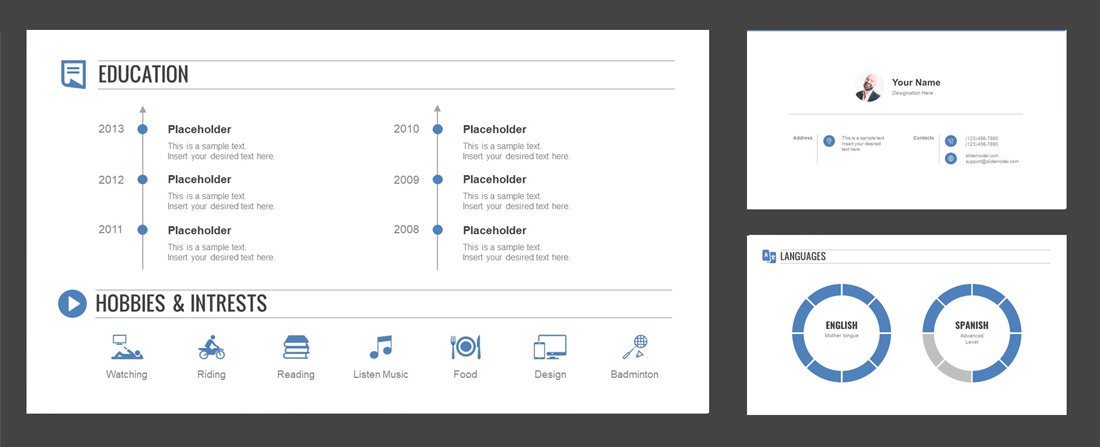
[ Use This Template ]
Before you get elbow-deep in designing that PowerPoint for a job interview presentation, do some scouting and reach out to the HR team with a few questions.
You want your presentation to be on-point and technically accurate, so ask your contact the following:
- How long should an interview presentation be? Fifteen minutes is the golden standard, though some employers may ask to cut it down to just 10 minutes or extend it to 20-25.
- Who exactly will be present? A conversational presentation would undoubtedly be welcomed by your peers and a team leader but may appear too casual for the senior managers or board of directors.
- Does the HR team have a particular agenda in mind? Ask some leading questions to understand what kind of skills/experience they want you to demonstrate. If needed, use a proper agenda slide to include your content.
- What’s the IT setup? Should you bring your laptop? Do you need an adapter to connect to their projector? What kind of presentation software have they installed – PowerPoint, Keynote, Google Slides?
Everyone appreciates clarity.
In fact, 89% of professionals state their ability to communicate with clarity directly impacts their career and income.
Your presentation should flow, not rumble. Make sure that your story is easy to follow and your key message is easy to digest, remember, and pass on. If you want people to retain your main points, opt for the following structure:
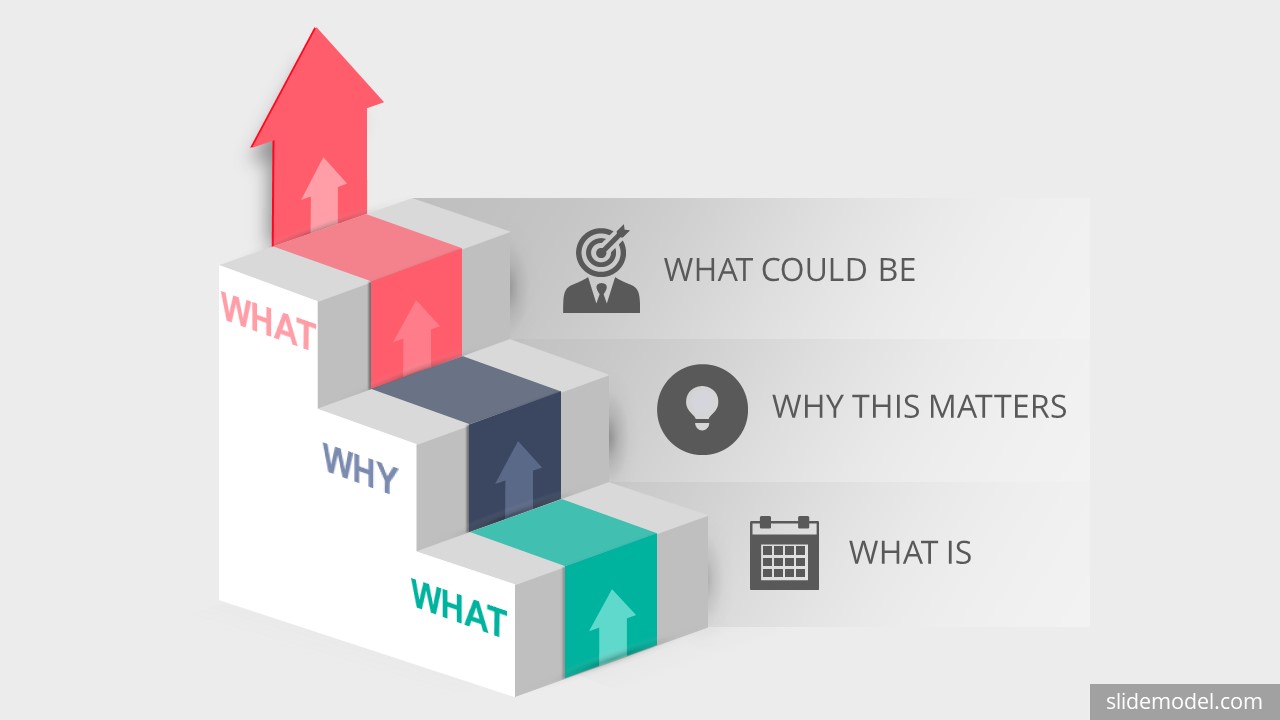
Source: this infographic was created with 3 Steps Editable 3D Ladder Infographic
Here’s an interview presentation example styled in this fashion.
What is: The company’s presence in the Middle East is low. Only 15% of revenues come from the top markets.
Why this matters: The UAE fashion market alone is expected to grow at a CAGR of 21% during the next five years.
What could be: I have helped my previous employer open a flagship store in Dubai, have a lot of industry contacts, and am familiar with the local legislature. Your brand can expect a 17% revenue growth within one year of opening.
You can find even more ideas for designing your presentations in this post .
The choice of slides will largely depend on whether you are asked to talk about yourself or present on some task that you will be required to do as part of your job (e.g., create marketing campaigns).
Most interview presentation templates feature the following slides:
- Opening Slide
- Quick Bio/Personal Summary
- Career Path
- Education timeline
- Key Skills and Expertise
- Case studies/examples of the problems you have solved at your past jobs
- Your vision for your future role.
- What exactly can you bring in as the candidate (we will come back to this one later on!)
Can’t figure out where to start? Check out our AI PowerPoint generator to create an entire interview slide deck in a couple of clicks, or just download a job interview template . Swipe down to learn from the either of the following job interview presentation samples.
Typically, a talent acquisition team will suggest broad interview presentation topics for you. For example, if you are applying for a sales position, they may ask you to develop a sales presentation for some product (real or imaginary).
Some employers will request a short presentation about you or your hobbies to understand whether you are a good “fit” for the team and share the company’s values. Remember this: your audience will be assessing your aptitude for the role, no matter which topic you were given.
In fact, the interviewers at this point don’t care that much about your experience and skills. They want to know how you can apply those to solve the company’s pressing problems – meet sales targets, improve ROI from social media marketing or help them earn more revenue.
Your job is to make an educated guess… predict the most wrenching problem, and pitch your “magic pill” during your interview presentation.
I know what you are thinking – but how do I find the right opportunity/problem to tackle?
Businesses across different industries pretty much struggle with the same generic challenges related to either of the following:
Your topic should clearly address one of these areas and offer a potential roadmap for solving some specific problem within it.
Let’s say that you are applying for a sales role. Clearly, you will want to tackle the “customer audience” set of problems. To refine your idea, ask yourself the following questions:
- Can you think of a new customer segment the company should target? Who are they, what do they want, and how you can help the company reach them?
- Do you have a network or experience to identify and pitch new clients?
- Can you think of new collaboration opportunities the company could use to attract a whole new niche of customers?
So a sample job interview presentation about yourself should include a series of Problem & Solution Slides , showing exactly how you will address that issue if the company hires you.
Here’s another PowerPoint presentation about yourself for job interview example worth using – incorporate a case study slide, showing how you have successfully solved a similar problem for your past employer.
Wrap up your presentation by laying out the key steps the company needs to take. Give an estimate of how much time it will take to tackle the problem, and what changes/investments should be made.
Your conclusion should tell this: “Hire me and I will solve this problem for you in no time!”.

Source: StockSnap
Dial-Up Your Power
Take a deep breath and strike a “power pose” before you enter the room.
According to her research, power posers performed better during interviews and were more likely to get hired. Another study also proved this theory: unaware judges gave major preference to the power-primed applicants. So yes, pep talks do work!
The first 30 Seconds Count The Most
What you do and say in the first 30 seconds will make the most impact. Psychological research shows that listeners form opinions about your personality and intelligence in the first 30 seconds of the interview. So be sure to start with a compelling opening, framing exactly how you want to be perceived.
Try To Appear Similar to the Interviewer
Lauren Rivera, a professor from Kellogg School, came to the conclusion that interviewers tend to hire “people like them” .
Even the top human resource management folks fall for this bias and tend to base their evaluations on how similar a candidate is to them, instead of trying to decide whether the person’s skill set is ideal for the position. So to be liked, you will have to act relatable.
Back up your statements with facts
To deliver a presentation with a bang, you can make use of pre-analyzed facts to support your hypothesis. Make sure to do your homework, study the company and its competitive landscape, and do the professional work you would have done as a member of the company crew. At some point in your interview presentation, you go “off the script”, and pull out a bunch of documents, supporting your statements.

For example, you can give away a quick plan indicating a number of things the employer could do today to save money, even if they don’t hire you. Make sure to be meticulous; your work will speak for you. But giving away this work will show the employer your commitment, skills, and focus.
And that’s exactly how to make your job interview presentation stand out. Most candidates just ramble about their skills and past career moves. You bring specificity and proof to the platter, showing exactly what makes you a great hire fair and square.
Within a selection process, there are many interactions (interviews and dynamics) that you must successfully complete in order to be the next selected candidate. One of your objectives in this first interaction should be to generate a great first impression in the company. For this, we recommend using the Elevator Pitch for Interview technique.
The Elevator Pitch for Interview will allow you to present yourself in a solid and professional way in less than 60 seconds, in order to generate an outstanding first impression.
What is an Elevator Pitch for an Interview?
The Elevator Pitch is a condensed speech about yourself that aims to generate engagement in no more than 60 seconds. Entrepreneurs widely use this type of speech to persuade investors and job seekers in job interviews. Your Elevator Pitch for the Interview will generate a great first impression to the employer and be better positioned than other candidates. If your goal is to make a convincing presentation in a job interview, your Elevator Pitch needs to be well crafted.
How to Make an Elevator Pitch for an Interview
There are many ways and tips to make an excellent Elevator Pitch for a job interview. This section provides you with essential advice to make your interview more convincing.
Identify your target
You need to know to whom you are presenting yourself. Is it a recruiter? or an executive?. Your Elevator Pitch will change depending on the receiver.
Comprehend the needs of the hiring company
Make an advanced study about the search requirements for the job position. Identify your strengths. Highlight them. Demonstrate your experience. Identify your weaknesses. Show that you have a profile that seeks constant improvement
Create a clear, concise, and truthful Elevator Pitch
This point is critical. Your Elevator Pitch must be clear, concise, genuine, and impactful. Go from less to more. Generate a real hook in your audience. Try not to go off-topic or talk too much, and be brief in everything you want to say.
Speak naturally and confidently
If you can speak fluently and naturally, you can show a confident profile. Show you know what you are talking about and what you want.
Elevator Pitch Example for Job Seekers
This section illustrates an Elevator Pitch Example targeted to Recruiters. It will help you put together your own.
“My name is [NAME]. After graduating with a degree in Business Administration, I have spent the last five years accumulating professional experience as a Project Assistant and Project Manager. I have successfully managed intangible products’ planning, strategy, and launch these past few years. I was excited to learn about this opportunity in Big Data – I’ve always been passionate about how technology and the use of information can greatly improve the way we live. I would love the opportunity to bring my project management and leadership skills to this position.”
Ways to avoid common mistakes in your Elevator Pitch
Keep in mind the following points to avoid making mistakes in your Elevator Pitch for an Interview.
Don’t hurry to make your Elevator Pitch
The Elevator Pitch lasts approximately 60 seconds. Do it on your own time and naturally, as long as you make it clear and concise.
Do not always use the same Elevator Pitch for all cases
One recommendation is not to repeat the same Elevator Pitch in all your interviews. Make changes. Try new options and ways of saying the information. Try different versions and check with your experience which generates more engagement and persuasion.
Make it easy to understand
Articulate your pitch as a story. Think that the person in front of you does not know you and is interested in learning more about your profile. Don’t make your Elevator Pitch challenging to appear more sophisticated. Simply generate a clear and easy-to-understand narrative, where all the data you tell is factual and verifiable.
Don’t forget to practice it
Practice is the key to success. Your Elevator Pitch for Interview will become more professional, convincing, and natural with practice.
How to End an Elevator Pitch?
An essential aspect of ending an Elevator Pitch for an Interview is demonstrating interest and passion for the position. You have already presented yourself and established that you have the necessary background for the job. Closing with phrases revealing passion and attitude will help reinforce your pitch.
We recommend you use expressions such as:
“I have always been interested and curious about the area in which the company operates, and it would be a great challenge for me to be able to perform in this position.”
“I have been interested in moving into your company for a while, and I love what your team is doing in IT.”
“I would like to advance my career with an employer with the same values. I know that thanks to my profile and experience, I can make excellent contributions to your company.”
Keep It Visual: Use visuals like images, graphs, and charts to convey your points effectively. Visuals can make complex information more accessible and engaging. Consistency Matters: Maintain a consistent design throughout your presentation. Use the same fonts, color schemes, and formatting to create a cohesive look. Practice Timing: Be mindful of the allotted time for your presentation. Practice to ensure you can comfortably cover your content within the time limit. Engage the Audience: Incorporate elements that engage the audience, such as questions, anecdotes, or real-world examples. Interaction keeps the interview panel interested. Use White Space: Avoid cluttered slides. Use white space to create a clean and uncluttered design that enhances readability.
Presenting during a job interview can be nerve-wracking. Here are some strategies to overcome presentation anxiety:
- Practice: Practice your presentation multiple times, ideally in front of a friend or mentor. The more you rehearse, the more confident you’ll become.
- Visualization: Visualize yourself by giving a successful presentation. Imagine yourself speaking confidently and engaging the audience.
- Breathing Techniques: Deep breathing can help calm nerves. Take slow, deep breaths before and during your presentation to reduce anxiety.
- Positive Self-Talk: Replace negative thoughts with positive affirmations. Remind yourself of your qualifications and the value you bring to the role.
- Focus on the Message: Concentrate on delivering your message rather than dwelling on your anxiety. Remember that the interviewers want to learn about your skills and experiences.
- Arrive Early: Arrive at the interview location early. This gives you time to get comfortable with the environment and set up any technical equipment you use.
Maintain Good Posture: Stand or sit up straight with your shoulders back. Good posture conveys confidence and attentiveness. Make Eye Contact: Establish and maintain eye contact with your audience to show confidence and engagement. Use Open Gestures: Employ open gestures, like open palms and expansive arm movements, to convey enthusiasm and openness. Smile and Show Enthusiasm: Genuine smiles and enthusiastic facial expressions demonstrate passion and eagerness. Control Nervous Habits: Be mindful of nervous habits like tapping or fidgeting, which can distract your audience and convey anxiety.
Stop fretting and start prepping for your interview presentation. You now have all the nitty-gritty presentation tips to ace that interview. If you are feeling overwhelmed with the design part, browse our extensive gallery of PowerPoint templates and cherry-pick specific elements ( diagrams , shapes , and data charts ) to give your interview presentation the top visual appeal.
Here you can see some 100% editable templates available on SlideModel that could be useful for preparing an interview presentation.
1. Versatile Self-Introduction PowerPoint Template
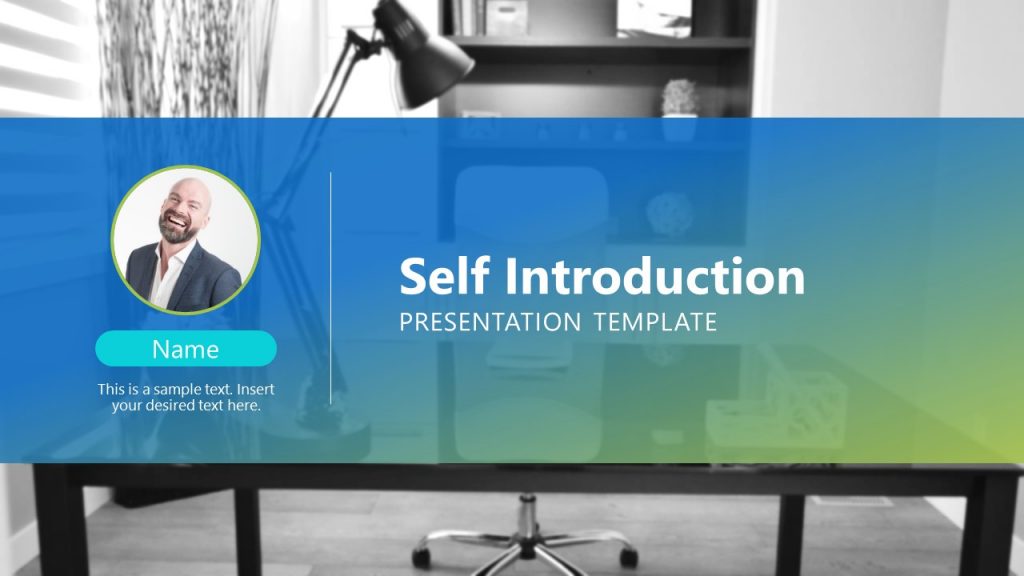
Use This Template
2. Professional Curriculum Vitae PowerPoint Template
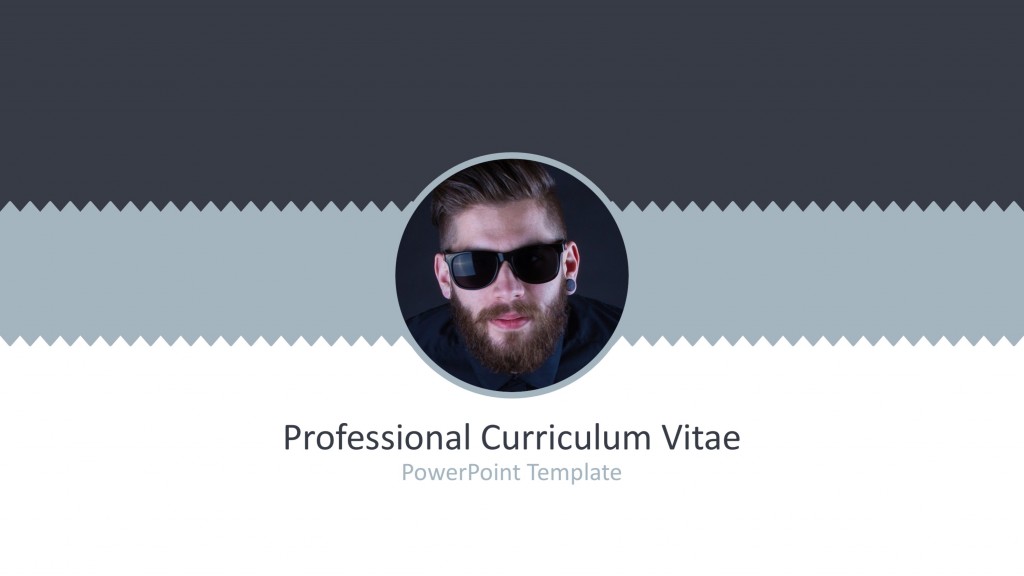
This a sample of PowerPoint presentation template that you can use to present a curriculum and prepare for a job interview presentation. The PPT template is compatible with PowerPoint but also with Google Slides.
3. Modern 1-Page Resume Template for PowerPoint
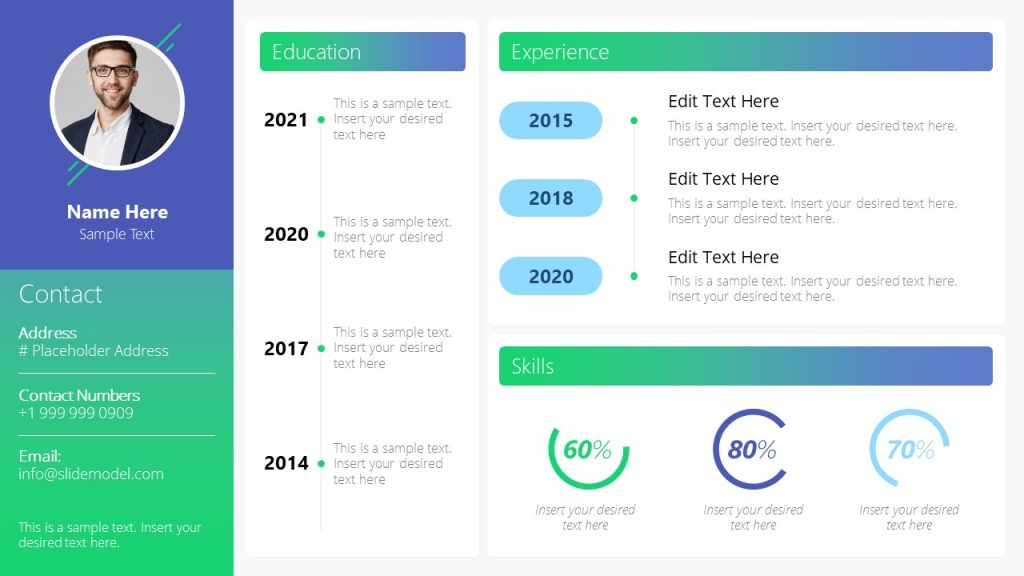
4. Multi-Slide Resume PowerPoint Template
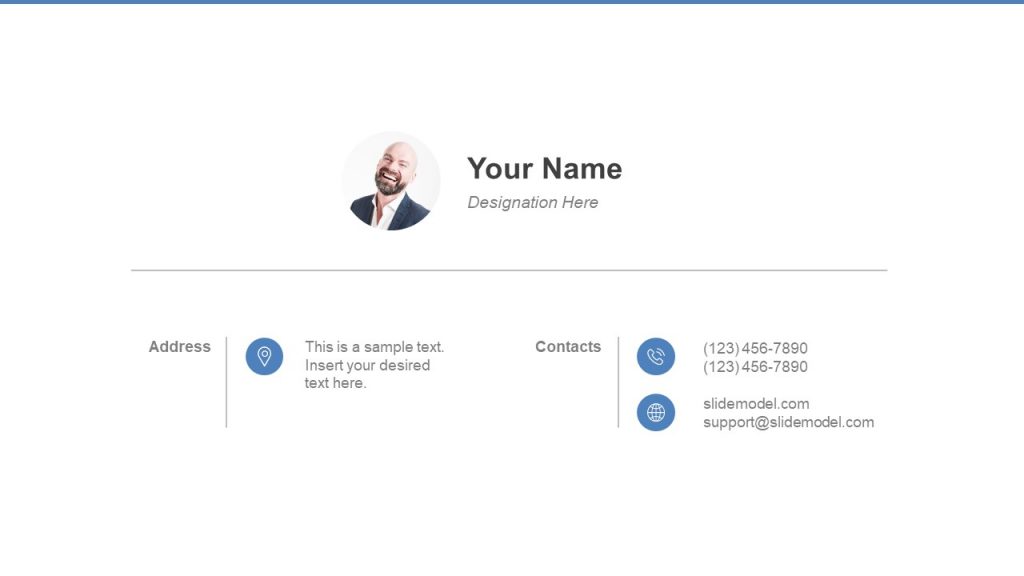
Like this article? Please share
HR, Human Resources, Interview, Job, Resume Filed under Presentation Ideas
Related Articles
Filed under Business • October 1st, 2024
How to Set Presentation Skills on a Resume
Discover the best ways to highlight your presentation skills on a resume, helping you stand out as a strong communicator and leader during job applications.
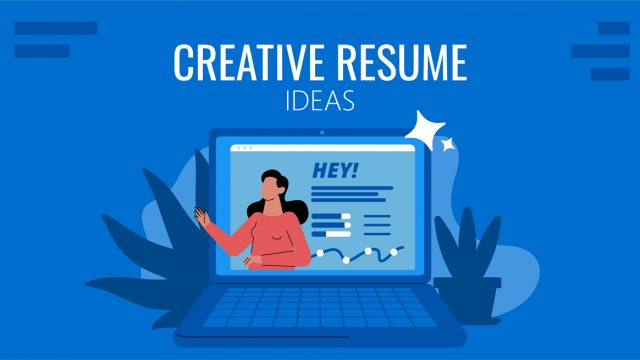
Filed under Design • July 19th, 2024
Creative Resume Ideas with Examples
This blog post presents some creative resume ideas that can be used for inspiration.
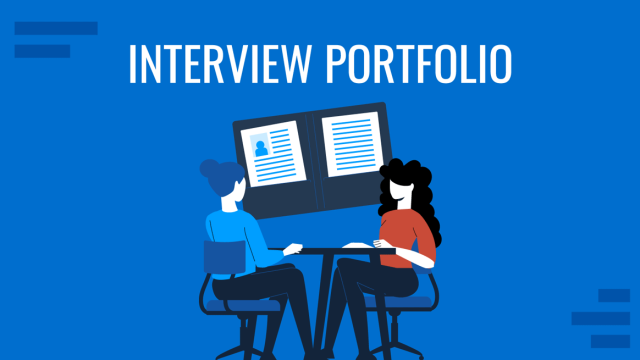
Filed under Business • April 17th, 2024
How To Make an Interview Portfolio (Examples + Templates)
Transform your job seeking experience into a smooth process by learning how to make an interview portfolio. Guide + Examples here.
One Response to “How to Give A Compelling Interview Presentation: Tips, Examples and Topic Ideas”
Leave a reply.

IMAGES
VIDEO